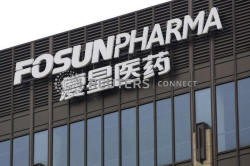 China's
Fosun to seek approval for BioNTech's COVID-19 second
vaccine, ends trials on first China's
Fosun to seek approval for BioNTech's COVID-19 second
vaccine, ends trials on first
 Send a link to a friend
Send a link to a friend
[November 04, 2020]
SUZHOU, China (Reuters) - BioNTech's
Chinese partner Shanghai Fosun Pharmaceutical Group does not plan to run
further clinical trials of the German firm's coronavirus vaccine
candidate that has completed early-stage trials in China, an executive
said.
|
|
 Fosun will focus instead on seeking Chinese approval for BioNTech's
other experimental vaccine which is in final-stage human trials in
the United States, Fosun's Chief Medical Officer Hui Aimin told
Reuters in an interview. Fosun will focus instead on seeking Chinese approval for BioNTech's
other experimental vaccine which is in final-stage human trials in
the United States, Fosun's Chief Medical Officer Hui Aimin told
Reuters in an interview.
The vaccine candidate developed by BioNTech and U.S. drugmaker
Pfizer Inc is under real-time regulatory review in Europe and could
seek emergency use authorisation in the United States after enough
safety data is provided as early as this month.
But the candidate known as BNT162b2 missed an earlier window to be
tested in China, as Fosun had rushed into Phase 1 trials of a
slightly less satisfactory candidate, BNT162b1, before early trials
data overseas showed BNT162b2 is safer.

Hui said he did not regret testing BNT162b1 without waiting for more
complete data.
"For ordinary vaccines, it does not matter if you wait for a few
days, or a month," Hui said. "But for (COVID-19 vaccines), how many
more people would have died had you waited just for one day?"
Hui said Fosun was applying for a bridge study for BNT162b2,
designed to evaluate whether the large trial data gathered overseas
could be extrapolated to the populace of China.
[to top of second column] |

A bridge clinical trial is required for pharmaceutical products
which are approved abroad but do not have data to show that ethnic
differences can affect their efficacy and safety, China's National
Medical Products Administration said.
Hui expected the late-stage candidate could be greenlighted for use
in China "around the same time" as the vaccine's global clearance.
Fosun is licensed to exclusively develop and commercialize COVID-19
vaccine products developed by using BioNTech's mRNA technology in
mainland China, Hong Kong, Macau and Taiwan. In return it agreed to
pay up to $85 million in licensing fees and invest $50 million for a
stake in the German firm.
(Reporting by Roxanne Liu in Suzhou and Tony Monroe in Beijing;
Editing by Miyoung Kim, Stephen Coates and Raju Gopalakrishnan)
[© 2020 Thomson Reuters. All rights
reserved.] Copyright 2020 Reuters. All rights reserved. This material may not be published,
broadcast, rewritten or redistributed.
Thompson Reuters is solely responsible for this content.
 |